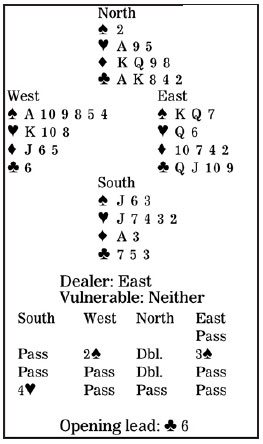Should you ruff partner's lead?


William Jennings Bryan, an orator and politician from Nebraska who died in 1925, said, "Destiny ... is not a matter of chance, it is a matter of choice. It is not a thing to be waited for; it is a thing to be achieved."
In some bridge deals, the outcome of the contract is predestined; but much more often, the result is in the balance. In today's deal from a duplicate, what should happen in four hearts after West leads his singleton club?
West's weak-two opening isn't textbook, but everyone would do the same today. Then, over North's takeout double, several Easts jumped to four spades, which usually went down two.
The play in four hearts was more interesting. Declarer had only three top losers: one spade and two hearts. But he didn't have 10 winners.
Although impossible to find, West's best lead was the heart eight. East could have won with the queen and returned the suit. Then South would have lost three blacksuit tricks and two hearts. But let's look at a table where West led his singleton club: king, queen, three. Declarer played a spade. East went in with his queen and returned the club nine.
Now West erred by ruffing the trick, which cost both a trump trick and a black-suit trick. East's carding (queen then nine) showed his holding in the suit. West should have discarded a diamond (or a spade). Then the contract would have failed.
After West ruffed, though, South took the diamond shift with his ace, played a heart to the ace and led another heart, claiming when they split.




































